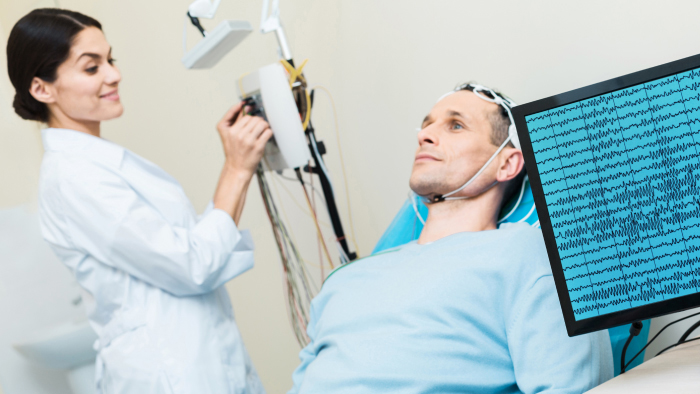- Routine outpatient EEG for infants, children and adults. (How to prepare your child for an EEG)
- Routine outpatient one-hour EEG's with video
- Outpatient somatosensory testing for adults
- 24- to 72-hour ambulatory EEG (Take Home Study) for patients 8 yrs and older
- Epilepsy monitoring unit
- Pediatric EEG studies
EEG Studies
The EEG/END Department at HSHS St. John’s Hospital is the only accredited EEG Laboratory in central Illinois providing neurological testing to patients.

The EEG Department is a three-patient bed unit located on the 1st floor of the hospital, across from the Radiology Department.
The EEG/END Department performs outpatient EEG procedures Monday through Friday, 8 a.m. - 4 p.m. Patients who are suspected to have seizures while at their doctor’s office and need to schedule an outpatient EEG can call the department directly. For more information, please call 217-544-6464, extension 2047590.
What is an EEG?
An EEG, or electroencephalogram, is a test that detects brain waves, or electrical activity in the brain. Sensitive electrodes are placed on the scalp to pick up electrical charges spreading through the brain. These charges are then mapped on a recording or a computer screen. The mapped electrical activity is interpreted by a neurologist who specializes in reading EEG studies and treating epilepsy. This information helps the neurologist identify the type and location of the seizure.
Is an EEG safe?
EEG has been used safely for many years and does not cause any pain or side effects. During the test, tiny electrodes are pasted to the scalp. These electrodes detect brain wave activity and transmit it to a computer. The electrodes don’t cause any tingling or other sensation, as they are just recording the electrical activity of the brain and not creating any electrical activity themselves.
Patients typically are asked to lie very still, relax and sleep. Pasting the electrodes and preparing for the EEG usually takes one hour for typical or "routine" EEG studies. During the test, patients may be asked to perform activities that could prompt a seizure, such as rapid or deep breathing, or looking at a bright or flashing light. More advanced EEG studies, such as video EEG recordings, are much more comprehensive and may last for up to a week.

Our EEG services

Pediatric EEG
ONLY ACCREDITED EEG LAB IN CENTRAL ILLINOIS
HSHS St. John’s Hospital provides the highest quality Pediatric EEG (electroencephalogram) in the region. As the only accredited EEG Lab in Central Illinois, our team of highly qualified professionals can effectively diagnose and monitor seizure disorders and identify causes of other problems, such as sleep disorders and changes in behavior.
Specializing in the diagnosis and treatment of
- Suspected Seizures
- Epilepsy
- Headaches
- Stroke
- Memory Loss
- Multiple Sclerosis
- Peripheral Neuropathy
What does an EEG show
EEG findings vary depending on the activities during the study. For example, during sleep the brain exhibits a different brain wave pattern as compared to wakefulness. The brain also generates different wave patterns depending on the type of epileptic seizure. The most informative pattern of change on routine EEGs, which occurs in between seizures, is called an epileptiform discharge. This is an abnormal buildup of electrical activity that typically occurs in the area of the brain causing the seizures.
Importantly, brain waves vary unpredictably in between seizures, and only 35-50 percent of people with epileptic seizures will show a definitive epileptiform discharge on routine EEG studies. Understanding these epileptiform patterns, along with a complete neurological exam and medical history, lets our neurologists determine the type of epilepsy and make recommendations for the best course of treatment.
When routine EEG studies do not result in clear findings, there are several options for further testing. A repeat routine EEG study, sometimes performed in the morning after a sleepless night (also called a "sleep deprived EEG") will bring out informative abnormalities on the EEG. In some cases, additional tests may be needed to supplement the routine EEG results.
Interpretation of advanced EEG studies, such as video EEG studies, requires specialized training in epilepsy. After general neurology training, our physicians go on to fellowships in clinical neurophysiology and epilepsy. Because of the large number of EEG studies and available specialized personnel, the facilities of our comprehensive epilepsy center remain among the most modern and largest in the country.